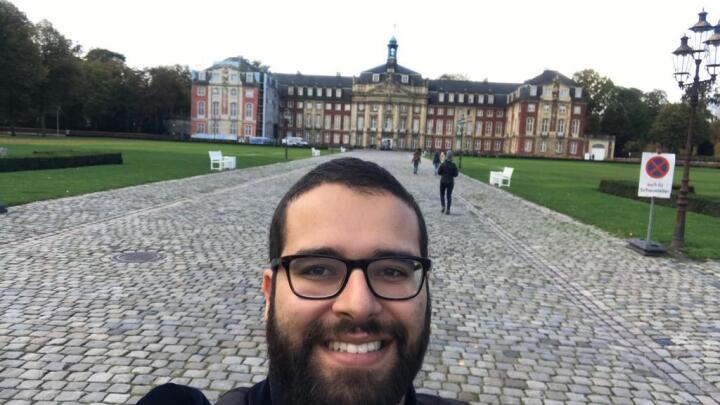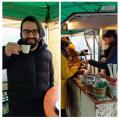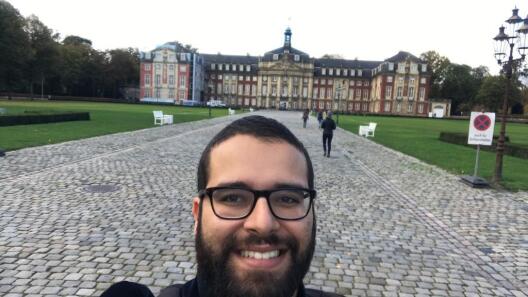
1. Brazil Centre: How did the research stay at the University of Münster contribute to your research, your scientific trajectory and/or professional career?
Pedro: My research stay at the University of Münster (UM) was part of a doctoral research internship. I was doing my PhD at USP, in the Law School, together with Professor José Maria and I had the opportunity to go to UM to perform part of my research together with Prof Fabian Wittreck's team from the Public Law Institute. The contribution that this research stay had for my research was fundamental. Even though in a short period of only three months, but the progress in terms of quality, of refinement of the bibliographic research and of the research hypotheses were fundamental. Prof Fabian Wittreck's team was very attentive, I always dialogued with all the researchers of the team and I also had the opportunity to present to the professor Wittreck, which I had taken the liberty of translating into English. We then had an extensive conversation of almost two hours, which was something phenomenal. The professor was very considerate to me during my stay. I also had the opportunity to talk with Prof. Englisch from the Institute of Tax Law and present him this very essay. Both professors made valuable contributions to the progress of the research. There were issues that bothered me and the professors, with all their experience, pointed out a way to solve these problems, which was sensational.
In addition, the UM library is fantastic, so I had access to many works that I could only find in Münster. The fact that UM is part of an international research network also gave me access to several journals that made it possible to refine my bibliography. My stay at the University of Münster also allowed me to establish and deepen contacts with Prof Paulo Mourão from the University of Minho in Portugal, who, although coming from the field of economics, helped me a lot with my research in the legal field. As he is an authority in the field I was researching, namely the topic of tax illusion. Prof Paulo's articles and works are always referred to in all works that address the issue of fiscal illusion, which was my research subject, even though under a legal approach.
So, after my stay at UM, I had the opportunity to teach a Master's class at the University of Minho and write a paper on tax illusion in Portugal together with Prof Paulo and Ana Araújo. That was sensational, because Prof Paulo Mourão was on the examining board for my disputation last year. I still have contact with him, just as I still have contact with all the researchers in Münster. In academic terms, my stay at the University of Münster was remarkable, but also in professional terms. The fact that I performed this research stay in Münster allowed me to dialogue with many academics and professionals both in Brazil and abroad. And my current position as advisor to a minister of the Supreme Court* has also enabled me to participate in a cooperation project between the University of Münster and the Supreme Court. Also in academic/professional terms, the contact I had with the university and its researchers was amazing and essential in defining the researcher I am today. I am very grateful for the stay, which was very remarkable and fruitful despite the short period of time.
* Pedro Araújo’s position at the time of the interview, which was conducted in March 2022.
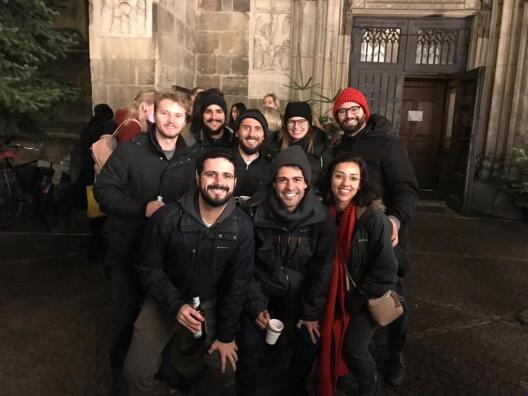
2. Brazil Centre: Did you have any difficulties during your research stay in Münster?
Pedro: Every stay has its difficulties. I was not in my home country and I was not used to the climate. I live in Brasília and the lowest temperatures here were often far from the lowest temperatures I experienced in Münster. For someone who was not used to the cold, this was a, I would not say difficult, but a new and remarkable experience. Another point is the language, unfortunately, I do not speak German, but that did not hinder my stay at the university, in the city and in the country as a whole in any way. People have always been open-minded towards me, I have started conversations by saying that I do not speak German and everyone accepted it calmly, saying that the communication could be done in English without any problem. The language barrier, then, was not a difficulty. I had a little trouble getting used to the routine of the institute, especially during the winter period. This wasn't really a problem, everyone was very attentive and always helped me to make my stay at the university as good as possible: They showed me how to use the xerox machine, how to scan, how to access "Disco" (bibliographical database of the Central Library), how to do research, and they even took the liberty of translating some texts from German into English that would help me with my research so that I could read them. It is therefore problematic to speak of difficulties when so many people are willing to help. As one would say in good Portuguese "I did not experience any 'perrengue'", everything was perfect.

3. Brazil Centre: What effect did your stay at the UM have on your personal sphere?
Pedro: I had several friends in Münster. Actually, it is wrong to say "had", because I have several friends in Münster. I got in touch with several people from the faculty, including other PhDs and researchers from Brazil who came to Münster. The woman who welcomed me in her flat is still a friend today. We exchange messages and have video calls to this day. We congratulate each other on our birthdays. My wife had the opportunity to go to Münster with us over Christmas and it was fantastic. She was very well received by everyone, it was great. In terms of personal friendships, I made a lot of friends who I am sure will remain friends for a long time. I was in Münster between 2019 and 2020 and I am still in touch with some people from the city and some people who were there.
In personal terms, I think that this international experience in another country with another language allowed me to mature like never before. It was something fantastic for me. I think I grew a lot as a researcher, as a professional, but also as a person. There is a part of this experience that is at the same time so close to ours (in Brazil), but also so distant. It is something that is very difficult to put into words. When you come to Germany as a Brazilian, sometimes you have a stereotypical view, and then when you are there, you realise that they are very similar to us in some issues and at the same time very different in others. It is something very nice.
I think I matured because I also had a very introspective moment, for academic research is also a moment of introspection. When you are at your doctorate, the dialogue, which is always important for the formation of understandings, is also a moment when the researcher thinks a lot, and the fact that you are in a reality that is completely detached from your daily life allows this introjection. I think I came out of my research stay much more mature than when I started. In personal terms as well, although it was unfortunately a short period of time, it was a remarkable three months that had the weight and value of a whole decade of life. It was a fantastic experience.
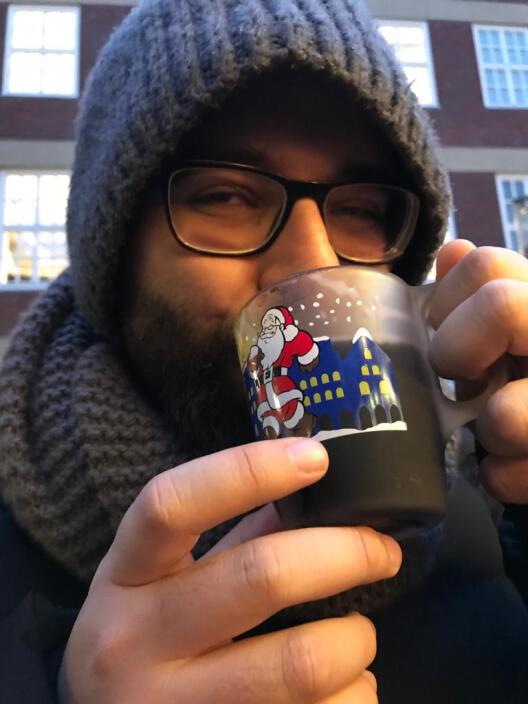
4. Brazil Centre: Does that mean you would recommend this experience to other people?
Pedro: Definitely! Not only would I recommend it, but I have also recommended it to several of my friends. I was not the first researcher that Prof José Maria pointed out the possibility of doing research in Münster. A predecessor of mine, my friend Leonardo Branco, was in Münster and had already told me that the experience would be fantastic, and after I came back, I endorse his words. I have already told several other PhD students of Prof José Maria that they should go, if they have the opportunity. I have also recommended it to the students of other professors at Largo São Francisco and to other researchers, even now, within the framework of this institutional cooperation agreement between the UM and STF, I have already recommended it to several people because it is something sensational. I can only highly recommend it, and if anyone needs suggestions and tips, you can count on me, send me an email and I will be happy to answer (smile). I will tell you not to miss a beer at "Pinkus", to go to all the Christmas markets during Christmas time, to drink a lot of "Glühwein" (I have several mugs of Glühwein - laughs), that helped me a lot to overcome the coldness of Christmas time. In any case, it was a very enriching experience and I recommend it to everyone who can do it.
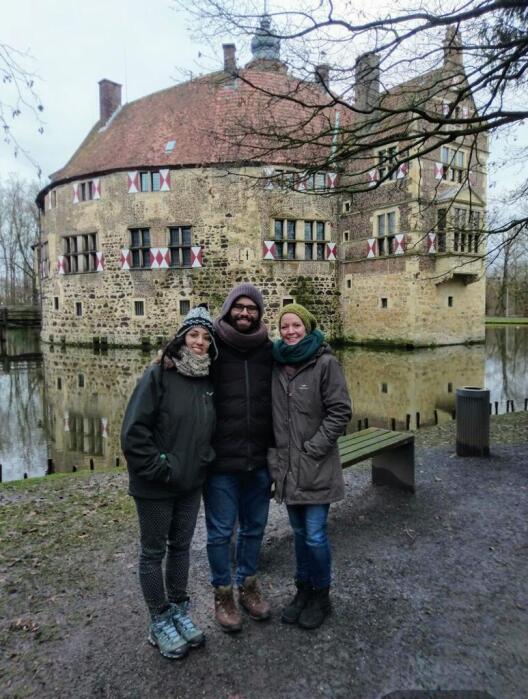
5. Brazil Centre: "Lost or found in translation"? Do you think you can express your UM experience in one word, one sentence or one quote?
Pedro: It was so significant for my life that I do not really have words to describe this experience. Any words I could say here will not be enough to describe it. Something close would be fantastic, wonderful, unforgettable. I think that "without words" is the best way to describe this experience in Münster.
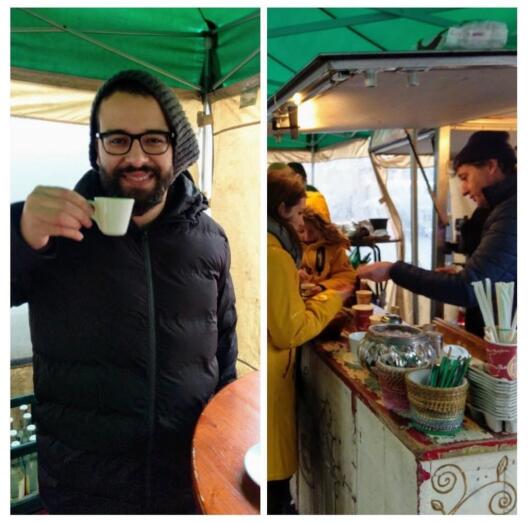
Brazil Centre: Let's move on to our "cafézinho moment", a relaxed moment in our interview. This is the moment when you can tell us when you can feel free to share with us an anecdote, a funny situation or a remarkable story.
Pedro: There are two stories I tell people that make them laugh. The first one has to do with the problem of the language barrier. I had to go shopping. When I wanted to buy a soluble coffee because I am addicted to coffee, I thought, "I'll buy a soluble coffee and take it to the institute". I went and saw this variety of options and thought, "I'll buy a good coffee, but I have to be careful not to take decaffeinated coffee". So, I looked for something close to German to first identify the decaffeinated coffee, which I didn't want to buy at all. I saw a packet and thought, "This is definitely not decaffeinated," and picked up the coffee. I was so sure I was buying the right coffee that I did not even make a point of looking in the translator. I took it to the institute and said it was for everyone. One fine day, three to four weeks later, a colleague asked me, "Do you like this coffee?", I said, "Yes, it's important to stay awake", to which he replied, "But you know it's decaffeinated, right?". I could only reply "you're kidding me!" And said "gee, the placebo effect is a real thing" (laughs).
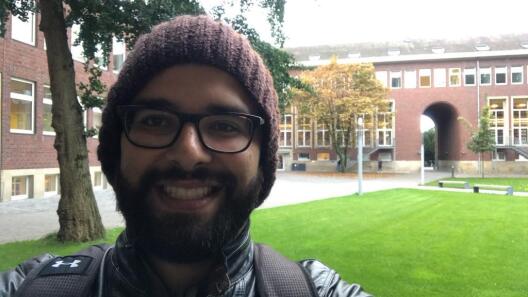
Another funny experience I had was in the first days. When I arrived in Münster, the weather was very typical, cloudy, rainy and the temperature was 8 degrees. In Brazil, summer was just starting and when I arrived in Münster it was autumn, almost winter. When I arrived, it was really a temperature shock. I always wore warm clothes, always a scarf and gloves, because the weather was cold and cloudy. One day the sun came out in the city. I was in the house where I lived and, because of the heating, the temperature inside was 20 degrees. I thought "What a bright sun, what a wonderful day, finally a sunny day!” I thought that I did not need warm clothes and I did not even put on a glove and, very relaxed, I set off for the Institute. When I left by bike (because in Münster you are always on a bike), it was cold, but freezing cold! My fingers were red, I only had a light T-shirt and a jacket on. When I arrived at the institute and checked the temperature, I found out that it was much colder than the days before. I even told my wife about the situation, she laughed and said, "Pedro, when it's sunny it's even colder!"
The Germans laughed and asked me if I had checked the weather forecast and the temperature, and I said that I had seen the sun, got dressed and gone to the institute. It was the coldest day in that period! They asked me what I was planning to do and I said I would leave at 4pm before the sunset and face the cold. However, they advised me not to do that. As I set foot out of the institute, I realised that I really could not return home like this. So I went to a shop and had to buy new gloves, a new scarf and a long-sleeved shirt to brave the cold. After a while I got used to the cold though. When it was close to Christmas and the maximum temperature was around 8, 9 degrees, which I found extremely cold when I arrived in Münster, I went out with lighter clothes because I already felt "warm" at those temperatures.
Those were two problems, but they are two "little problems" that are so funny that you cannot call them that. Those are experiences that you grow from (laughs): Never buy a coffee without looking at the translator, and never leave the house without checking the weather forecast first (laughs).
Brazil Centre: Pedro, we thank you very much for sharing your experiences with us with such enthusiasm. We are very happy that you had a very fruitful stay academically and very enriching personally. We wish you all the best and hope that your connection to the University of Münster will continue and bear even more fruit in the future.


